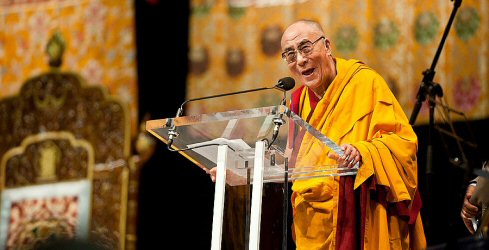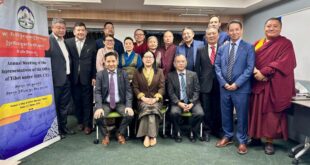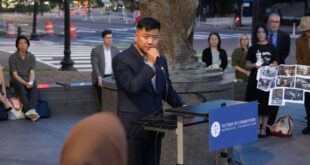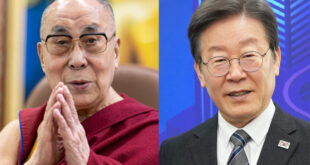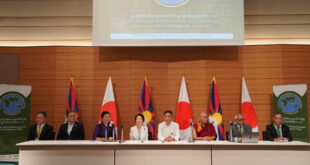His Holiness the Dalai Lama left the hotel for the Verizon Center, venue of the Kalachakra teachings, early in the morning to begin the preparatory prayers. The Board of the Capital Area Tibetan Association received him on his arrival at the Center. After the ceremonial Mandala offering, His Holiness began his prayers. In the course of it His Holiness briefly addressed the audience about the background of his relation with the Kalachakra Initiations. He said he had received the empowerment first in 1954 at the Potala Palace in Lhasa from Kyabje Ling Rinpoche, his Tutor. Subsequently, he had bestowed the Kalachakra twice while in Tibet. After coming to India in 1959 His Holiness said the first time he gave the teachings then was the one in Dharamsala (in March 1970). His Holiness shared with the audience an “interesting dream” that he had at the conclusion of the initiation in Dharamsala. He said that he dreamt about the process of the dismantling of the Mandala and that he was sitting in the center of the Mandala. Calling it an auspicious dream, His Holiness added that he took this as auguring he would be bestowing the initiation many times thereafter. He added that the current empowerment would be his 31st Kalachakra empowerment.
Talking about the two preliminary teachings on 37 Practices of a Bodhisattva and Stages of Meditation, His Holiness said in a lighter vein that he indulged in a little bit of deception. Given the attraction of the Kalachakra to the people he took to announcing such an initiation so that many people would turn up. But he said his main focus would be on the preliminary teachings that touched on the deeper understanding of Buddhism. His Holiness joked that he if announced just a Buddhist teaching, he said many Buddhists might tend to think that they know about Buddhism and not come.
Following a break, the program to celebrate the 76ths birthday of His Holiness the Dalai Lama, which fell today, began. Organized by the Office of Tibet in New York, this program was moderated by Mrs. Tencho Gyatso (of the International Campaign for Tibet). She said that Mathatma Gandhi and Dr. Martin Luther King Jr. were two illustrious personalities whose lives continue to inspire His Holiness the Dalai Lama. She then invited everyone to join her in welcoming Mr. Martin Luther King III, the son of Dr. Martin Luther King, Jr., Mr. Arun Gandhi, the grand son of Mahatma Gandhi, and His Holiness the Dalai Lama to the stage.
The program then began with a song “Topay Luyang” praising the qualities of His Holiness, sung by young members of the Capital Area Tibetan Association. Thereafter, representatives of some of the communities, including Indians, Mongolians, Japanese, Chinese, Bhutanese, Vietnamese, Tibetan, people from the Himalayan region of Nepal as well as Caucasian Americans and others greeted His Holiness, symbolizing the universal reverence and respect that he enjoys. At the end, Kasur Alak Jigme Lhundup presented the first copy of a book titled “Jigten Migpe” featuring a comprehensive collection of photos from His Holiness’ life. He released the book, published by Dhomey Tsengol Dhengyab Nadel, and offered a copy each to Mr. King and Mr. Gandhi.
Thereafter, Mr. Kalden Lodoe, President of the Capital Area Tibetan Association, which is the organizer of the Kalachakra for World Peace teachings, made welcome remarks. He began by offering birthday greetings to His Holiness the Dalai Lama on behalf of everyone attending the teachings.
He said, “Throughout his life, His Holiness has tirelessly dedicated his life to the promotion of universal human values, religious harmony and the issue of Tibet. At a time of escalating global tensions and conflicts, it is our fervent belief that the conferment of Kalachakra by His Holiness here in Washington, DC will renew and reinforce the shared basic human values; universal love, compassion and world peace.”
Mr. Lodoe then gave a background on how the Capital Area Tibetan Association came to request the teaching and how the immense challenges were faced. He announced that there were people from 48 countries and five continents who were attending the teachings.
He concluded by saying, “…we humbly want to offer our work on this great event as an expression of gratitude to the government and the people of the United States and to all those around the world who have so kindly supported the preservation of Tibet’s rich culture, spiritual heritage and distinctive identity over many years. Your kind and generous commitment has enabled Tibet’s unique wisdom – heritage to survive, and spread, and take root in all parts of the world.”
He ended with a recitation of a prayer for the long life of His Holiness the Dalai Lama.
Thereafter, Mr. Kwame Brown, Chairman of the Washington, D.C. City Council, made a formal welcome to His Holiness to the city. He thanked His Holiness for speaking out on injustice in Washington, D.C. He said His Holiness gave inspiration to students of a school in the city as also a homeless shelter that he had visited some time back. He said His Holiness brought the message of peace to the city and presented a City Council Resolution to His Holiness recognizing and honoring his commitment to Tibet and the unparalleled global impact of his message of peace and democracy. The resolution was “To honor and recognize His Holiness the 14th Dalai Lama, Tenzin Gyatso, for his tireless commitment to world peace, non-violence, human rights, religious freedom, and democracy. Full text of the resolution given below.”
His Holiness thanked the Chairman and also offered him a copy of the illustrated biography.
Thereafter, a touching video message from Archbishop Desmond Tutu was screened. In it, the Archbishop talked about the positive impact of His Holiness to the international community and how people could commit themselves to doing something good to celebrate His Holiness’ birthday.
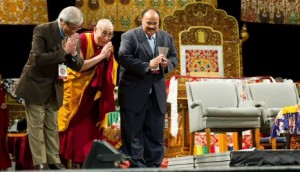
Mr. Arun Gandhi was invited to make his remarks next. He began by wishing His Holiness on behalf of the Gandhi family. He then shared one of the lessons that he had learned from his grandfather about peace, namely that it pertains not only to physical violence but alto to non-physical or passive violence. Passive violence is something that some times we even fail to recognize as violence. He talked about the danger of passive violence that Mahatma Gandhi often highlighted.
He invited everyone to join him in giving “the most profound birthday gift” that that all of us can give to His Holiness today is to pledge that we will no longer hate, we will no longer discriminate, we will no longer be greedy, that we will always respect each other irrespective of their religion or their philosophical pronouncement that they will love and try to bring peace for this world for the future generation.
Mr. Martin Luther King III began by referring to His Holiness as a spiritual leader who is revered by the people of his beloved homeland, Tibet and by people all over the world as the very embodiment of compassion.
He recalled his mother, Coretta Scott King, writing in 1989 after hearing the announcement of the Nobel Peace Prize to His Holiness that “The Dalai Lama has been a clarion voice for nonviolence and freedom … one of the planet’s great spiritual leaders, and the breadth and depth of his concerns embrace the future of all human kind.”
Mr. King said, “If we embrace the teachings of Mahatma Gandhi, Martin Luther King, Jr. and the Dalai Lama, we can tap the power of the telecommunications revolution to build a global network of mutually-supportive people dedicated to nonviolent action for peace and social justice.”
He added, “Today we celebrate the luminous example of courage and dedication to peace and goodwill you have provided, and we draw hope and inspiration from your continued visionary leadership. “
Thereafter, His Holiness made his remarks. He began by sharing with the audience the traditional Tibetan culture of treating death anniversaries as being more important than birthdays. This was rational because he said by the time someone passes away we would know whether the individual has made positive or negative contributions. Whereas, wishing happy birthday to a person who subsequently may end up being negative did not make sense.
His Holiness then reiterated his basic belief and the message of the Buddhist teaching that if an individual can help others, everyone possible should be done to make it so. However, if help cannot be rendered then the individual could at least restrain from harming others, he said. He said that such an approach would help in leading a meaningful life.
His Holiness referred to the birthday message by his “spiritual elder brother” Archbishop Desmond Tutu and shared with the audience how the two enjoyed teasing each other, which was missing from the video message, he said. His Holiness said that it was his hope to join Archbishop Tutu in South Africa during his birthday in October.
His Holiness said that he had never met Mahatma Gandhi or Martin Luther King Jr but that he admired their direct concern for their respective communities and indirectly to humanity. His Holiness added that he not only admired but also worked to carry on their spirit to promote nonviolence.
His Holiness said in the presence of the two distinguished guests he wanted to place on record his commitment to the promotion of human values and the promotion of religious harmony. He said that today the fact that Mr. Arun Gandhi, a Hindu, and Mr. Martin Luther King III, a Christian, coming together to celebrate the birthday of a Buddhist was a strong message of religious harmony.
His Holiness expressed his gratitude to the people from the different communities coming to greet him saying that most of them were from areas that had historical relationship with Tibet.
His Holiness also praised the Tibetan children for their song saying their singing was good and joked as to how many hours they may have wasted in preparing for this. His Holiness underlined the need for education here saying that there was the need for education of the brain as well as for the development of warm heartedness.
Thereafter, His Holiness switched from speaking in English to speaking in Tibetan to directly address the Tibetans who have gathered in the Verizon Center as well as many others, including in Tibet, who were watching the direct broadcast (by Voice of America’s Tibetan service as well as over the internet).
He referred to the existing Tibetan feeling of a common identity irrespective of where they were living and stressed on the need to preserve and promote Tibetan linguistic tradition, which has been there from the time of the religious kings. Along with the preservation of the traditional language there was the need to pay attention to modern education.
His Holiness advised the Tibetans to study Buddhism more deeply rather than being concerned with the ritual aspect. He said the people needed to be 21st century Buddhists.
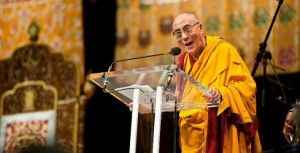
His Holiness also expanded on the recent devolution of his political authority to an elected leadership saying that this was a positive development. He said through the recently held election process, a new Kalon Tripa has been elected, who is from the younger generation, born in India, with a wholesome education. He said this successful devolution of authority has challenged the Chinese assumption that the Tibetan issue is dependent on one individual. He said it has become clear that the political process will continue irrespective of whether the Dalai lama was there or not. His Holiness said from around the age of 14 or 15, he had very keen interest in democracy and while in Tibet he had made efforts towards democratization by establishing reforms commission around 1952-53. But after coming into exile he was free to implement his thinking and thus the Tibetan democratic process has been developing over the years. He said the time has come for the elected Tibetan leadership to take real responsibility.
His Holiness also explained that his move at devolution of authority was not because he had become demoralized. Rather, it was another process in the democratization of the Tibetan society. His Holiness also said that the change in the way of referring to the Central Tibetan Administration in Tibetan was to be more transparent and not to indicate any closure of the Administration.
Kasur Lobsang Nyandak Zayul, Representative of His Holiness the Dalai Lama for the Americas, gave the concluding remarks.
He said, “20th century is generally perceived as a century of war and violence, when tens of millions of people had died a violent death. The same century, however, also witnessed outstanding apostles of peace and non-violence, who brought freedom and justice to millions of subjugated peoples the world around.
“Amongst those apostles of peace is Mahatma Gandhi, the father of great Indian nation, who is represented here by none other than his grandson Arun Gandhi. Your presence here has made this occasion a memorable day. On behalf of the organizers of this event, people who are gathered here, and also on behalf of Tibetans inside Tibet who have no freedom to celebrate the birthday of HH, I extend our heartfelt gratitude to you.
“Another historical apostle of peace is Dr Martin Luther King, Jr. whose name is in the hearts of all those who care about peace, non-violence and who care about freedom and social justice.
“We are immensely grateful to Martin Luther King, III, the second child of Dr. Martin Luther King, Jr. for joining us today on this special celebration and making this occasion.”
He continued, “There is no better way to thank Your Holiness than each one of us promising to generate within ourselves the good human values, such as love, compassion, tolerance, forgiveness and most importantly, even if we cannot help others refrain from harming other sentient beings.
“The making of this event was memorable indeed for everyone involved. I wish to take this opportunity to express my sincere appreciation to Capital Area Tibetan Association for their fullest cooperation; my colleague, Special Envoy Gyari Rinpoche, for his guidance and help; and to the International Campaign for Tibet for their cooperation. I also wish to thank the City of Washington DC for honoring His Holiness and also providing warm reception to HH whenever he is in the city.
We are always deeply appreciative of all the courtesies expanded by US government.”
His Holiness then went for his lunch before continuing his preparatory prayers in the afternoon.
At noon, there was a parade by representatives of the Tibetan associations throughout the North America that began at the Verizon Center and ended on the National Mall. Several thousand Tibetans participated in the parade that ended with traditional dances by the people on the Mall.
On July 7, His Holiness continues his preparatory prayers in the morning and in the afternoon, House Speaker John Boehner will host a bipartisan meeting with His Holiness at the Capitol.
